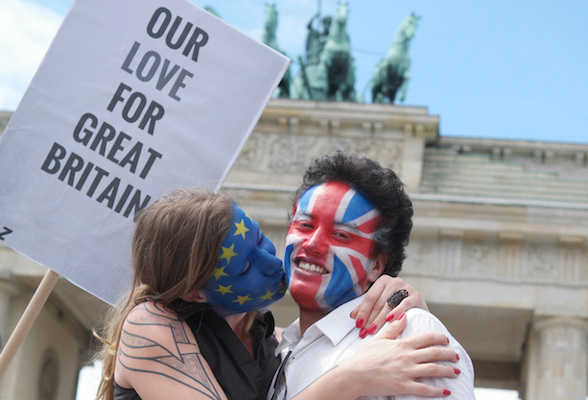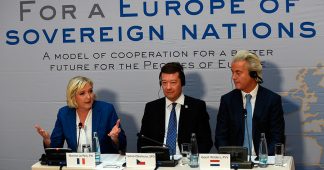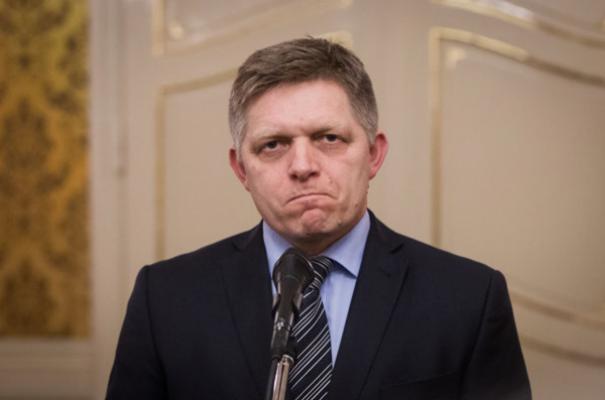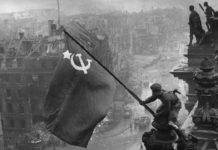On the progressing loss of consensus for the neo-liberal regime
By Wilhelm Langthaler
Published on: May 7, 2016
The results of the first round of the presidential elections were an unexpected shock for the ruling Grand Coalition composed of Social-democrats and Christian-conservatives. This has been the political formula for the neo-liberal regime ever since the late 1980s. But the popular masses more and more turn their backs on them. The point of collapse is coming closer. The opposition from below, however, is being articulated mainly by a cultural chauvinist refusal of Islamic migration and is led by the historic right-wing forces.
New ascendancy of FPÖ – social-cultural protest from below
The sweeping success of Hofer, the Freedom Party’s candidate, is first of all expression of the protest by the subaltern classes. If the post-poll analysis can be trusted, about two-third of the workers cast their ballots for him. The pattern is known from earlier elections. In the historically industrial cities the lower segments of the former SP constituencies turn to FPÖ. For SPÖ has tied itself organically to the party of the big capital, ÖVP. Even more, it has taken the lead of the historic bloc of neo-liberalism. Parliamentary expression of this amalgamation is the explicit exclusion of the FPÖ from any governmental participation spelled out in the late 80s and adhered to ever since. Only by keeping this door open a mitigation of the neo-liberal onslaught would have been possible, if the SPÖ had wanted. At least that is what the FP’s lower classes constituencies would have expected. It is not by accident that ultra-liberal forces use to call the FPÖ a “left-wing party in terms of socio-economic policies”.
During the recent electoral campaign the FPÖ has not only been opposing TTIP (several parties are flirting with that given the overwhelming refusal by the people) but more importantly was the only party criticising the EU.
Enemy Islam
Though the FPÖ is the only party putting into question the neo-liberal supra-national institutions one needs to bear in mind that this is inextricably linked to refusing migration altogether. While it is obvious that migration does have a socioeconomic impact further driving down wages of the lowest segments of the working class especially in periods of austerity and generalized unemployment and wage depression. But the FPÖ directly attacks the migrants themselves while neglecting the systemic context.
They are spearheading the cultural chauvinist campaign mainly against Muslims. They are leading a full-fledged campaign against Islam as such and an alleged Islamisation thereby contributing to the newly invented Jewish-Christian European identity narrative.
This goes hand in hand with a pro-Zionist turn operated some years ago substituting Muslims for Jews as the enemy. While originating from historic anti-Semitism the party joined the campaign against left-wing anti-Zionism labelling criticism to Israel as anti-Semitic in the same way as the liberal mainstream does.
The loosening of the EU’s border regime by Berlin in summer 2015 and the ensuing wave of refugees greatly helped the growth of FPÖ. They credit themselves for the gradual restoration of the previous migration regime by the beginning of 2016.
Cross-class composition
The Freedom Party did not only gain in the working class neighbourhoods but also in middle class suburbia. Originating from German nationalism of the middle classes they are now re-collecting its cultural chauvinist parts by modernising old biologist racism rendering it more digestible for larger strata. In these environments the social momentum is lacking similar to AfD and Pegida in Germany while economic liberalism prevails.
In some regions the party’s influence reaches into the ruling bloc as well. There is the historic exception of Carinthia which never has been underr Christian democrat hegemony also because of German nationalism poised against the Slovene population once holding a majority. There is the province Burgenland in the extreme east where recently a coalition SP-FP has been formed to shield the borders from the influx of refugees. But most important is the VP-FP coalition in the industrial heart of Upper Austria. There the Freedom party is following the track paved by Haider one decade back joining the neo-liberal ruling bloc as a junior partner without any rupture.
There are historic breaks but also continuities: The FPÖ started of with collecting the shattered Nazis, administered the fading out of German nationalism and eventually even provided the parliamentary majority to Kreisky’s social reform by the early 1970s. When the mainstream turned to neo-liberalism during the 1980s the party under the newly elected chairman Haider took a plebeian turn. They embraced more mass-compatible Austrian patriotism (hiding away the German nationalist core) and gradually attempted to address the lower and working class softening economic liberalism. The current chairman Strache has been the figurehead of this successful line. And that is not only a mere camouflage as many leftists continue to believe.
Conversely that does not mean that the party is ready for a break with the elites. Rhetoric against the EU is based on allusions, stereotypes and ranting. They never called for the exit.
Two souls live within one party and Haider used to virtuously conduct them both. This can continue as long as the promises are not tested by public office. When the party entered an ultra-liberal VP-led coalition government the plebeian electorate rapidly turned away. In the very last minute Haider recognised the danger which led to a split with the more bourgeois part (BZÖ). The impact of a new governmental participation depends on the overall societal context, the depth of the social crisis and not least on whether the Euro regime will collapse.
The leftist denunciation of the FP as radical neo-liberal vanguard is not plausible. In the end it amounts to a justification of the liberal centre which thus appears as the lesser evil not only in politico-cultural but also in socio-economic terms. One should, however, not forget that the FP’s working class electorate is not much radicalised while the historic ties to the elites remain intact and are likely to prevail. But the FP’s possible adoption by the oligarchy will probably not go that smooth as under the leadership of Haider.
Dawn of the Grand Coalition
The recent electoral results are serving as a clear indicator: the regime of the last quarter century is drawing to a close. It is true that the only representative constitutional role of the president renders the elections prone to protest similar to the ballots for to the European parliament. Nevertheless the tendency is crystal-clear and sooner or later the Grand coalition will loose its majority making the FP’s participation in a government indispensable. Within the SPÖ the voices are becoming more vocal which call for the end of the FPÖ’s exclusion. There are two variants:
Forming a coalition with the Christian democrats: Though the FPÖ this time will have the leadership, the ÖVP with the capitalist oligarchy calling the shots will nevertheless set the pace. In such a case the FPÖ runs the risk that once again it will quickly lose its credit across the popular classes creating a new political vacuum.
The more suitable variant for the Freedom party would be to go with the Social democrats which would be more digestible even in the role of a junior. That would be a real experiment with an outcome difficult to predict all the more if it coincides with the collapse of the Euro.
A Spanish scenario is possible with no stable government altogether – a constellation unheard of in Austria for decades.
Leftist anti-Berlusconite
The historic left have been remaining within the orbit of integrative Social democracy thus politically covering the (neo)liberal centre. For them the FPÖ represents the Absolute Bad which must be a prevented at any cost. The price is the red-green embrace of neo-liberalism and the EU. Left culture has been turned upside down. It has delivered ideological elements to the elite, e.g. internationalism. They do not want to see that the cultural chauvinist form social protest has been taking has to do with the leftist form the ruling programme has acquired on its part.
Now nearly the entire left calls to vote for the left-liberal van der Bellen from the Green party in the run-off. They reproach to Hofer an authoritarian drive. (“Die Zeit” suggestively asks whether Hofer might turn out to become a new Hindenburg.) At the very same time they neglect that van der Bellen announced that he would refuse to swear in a government with the FP’s participation. That blatantly violates the constitution and appears to be a much more concrete presidentialist threat to the strongly parliamentarian Second Republic. Explaining his announcement he said that a government with the FPÖ might disregard the EU institutions – actually we have already seen in which way these unelected supranational bodies abrogated national decisions taken by elected governments.
Vacuum at the popular left
The de-facto participation of the left in the ruling neo-liberal bloc leaves the protest of the subalterns entirely to the leadership of rightist forces. There is, with the local exception of the Communist party of Styria, no significant independent leftist force, endeavouring to become the voice of the lower classes. This picture become even more dramatic of one takes a glimpse at the positions on the EU institutions. On the left there is only the committee euroexit.org with its components, which dares to name the Euro regime and the EU as organic instruments of the neo-liberal elites and consequently campaigns to overturn it. As of now there are no critical voices to be heard neither in the institutional left, nor among intellectuals or artists, let alone in the apparatuses of science, media or unions. Therefore the right can score points even with very vague and ambiguous positions.
This is all the more paradox as European polls show that Austria continuously and consistently appears among those countries where scepticism on TTIP, Euro rescue operations and even the EU at large is most developed – similar to Scandinavia. And that was even the case when Southern Europe used to be under the spell of Europeism.
How the extreme embrace of the liberal centre and its EU by the civil society in this specific context can by explained? (The notion civil society is being used in the original sense of Gramsci to denominate the indirect mediation apparatus of bourgeois rule.) Both socio-economic as well as politico-cultural reasons can be identified.
Austrian industry as an appendix of German export business doubtlessly is placed among the winners of the Euro regime and globalisation at large. So the impact of global crisis is less felt than in the peripheral Euro countries. In difference to Germany the attack on welfare and the lower wage segments has been more moderate. Especially the precarisation of civil society, the ideological apparatus of the regime, has not hit Southern European magnitude. Intellectuals do have to lose something.
Not less important is the irrational fear of the German nationalist rightwing, which is being prescinded from history. The left was not able to beat National Socialism by its own forces but remained auxiliary to Soviet and US power. With the fading out of the Cold war social democracy domesticated leftist anti-fascism eventually elevating it to a kind of state ideology. The weak independent left was either absorbed into SPÖ or marginalised. Its insignificance, its self-doubts and the resulting pessimism combined with the persistent hope of the middle classes that the post-war system would stay forever leads to regard the EU as guaranty of civilisation and the ruling order as lesser evil.
Popular social and democratic programme for a clear break
The lines on which a popular leftist alternative can be built emerge pretty clear: imposing an end to social degradation of the popular classes and regaining a democratic say can only be achieved by preparing the rupture with the neo-liberal oligarchy and its supra- and international institutions and first of all the EU. The re-appropriation of national sovereignty must be conceived as the regaining of popular sovereignty against the increasing dictatorship of the capitalist elites, a process by which the productive apparatus is being put at the service of the majority.
This has nothing to do with an alleged return to ethno-nationalism. On the contrary, behind globalisation the interests of the dominant national oligarchies are being hidden. This is being revealed constantly with regard to the US policy. But also facing the Euro crisis the EU response was dictated by German ruling class. The elites’ internationalism provokes national self-defence. This can assume a popular democratic but also a reactionary character.
Modern Austrian statehood and constitutional neutrality emerged in defence against and in defiance of German imperialism. It can serve as democratic reference both domestically and internationally. Internally it can represent the concept of a nation constituted on politico-cultural criteria and not on ethno-nationalist ones despite the common language with the all too powerful neighbour. Although a sovereign nation is to control the flux of the productive factors (labour, commodities and capital) the concept offers a possibility to democratically deal with the arrival of different identities and to shun Islamophobia. With regard to foreign policy neutrality can be interpreted in the direction of global social rebalancing, peace and anti-imperialism











